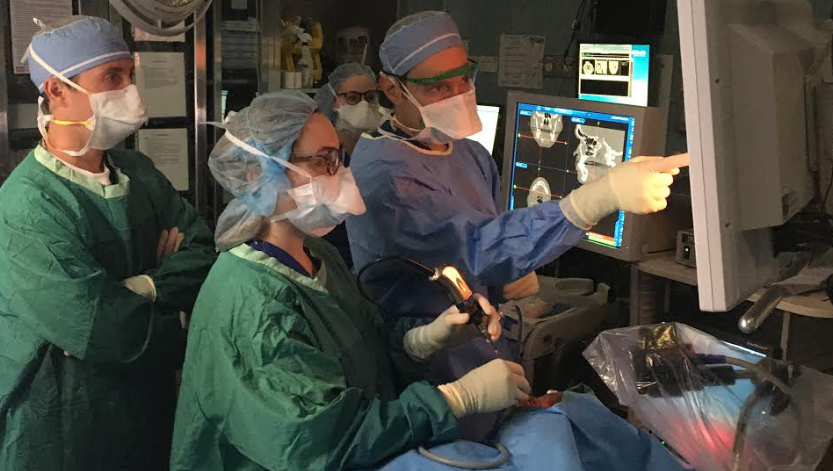Discovering the Field of Otolaryngology: What to Anticipate When You Seek Advice From an ENT
Otolaryngology, frequently referred to as ENT, encompasses the medical diagnosis and therapy of ear, throat, and nose disorders. For those experiencing relevant issues, seeking advice from an ENT professional can give clarity and relief. Recognizing what to expect during such examinations is crucial for effective communication and treatment. This summary will detail crucial elements of the ENT experience, consisting of typical reasons for check outs and the processes associated with medical diagnosis and therapy.

Recognizing Otolaryngology: A Summary
Otolaryngology, frequently described as ENT (Throat, ear, and nose) medication, is a customized branch of medicine that concentrates on the diagnosis and treatment of conditions impacting these vital areas of the body. This area incorporates a wide range of disorders, including those pertaining to hearing, equilibrium, breathing function, and speech. Otolaryngologists are educated to manage both medical and medical therapies, utilizing innovative techniques and technologies. Their expertise expands past traditional conditions, addressing concerns such as allergic reactions, sinus infections, and hearing loss. Furthermore, they play a crucial duty in the administration of head and neck cancers cells, providing thorough treatment customized to individual client demands. On the whole, otolaryngology continues to be crucial for preserving health and wellness and lifestyle in affected individuals.
Usual Factors to See an ENT Professional
Numerous people seek the know-how of an ENT professional for a variety of reasons, showing the varied nature of conditions that affect the ear, nose, and throat. Typical concerns include persistent sinus problems, which frequently brings about relentless nasal congestion and face discomfort. Allergic reactions and their associated signs and symptoms, such as itching and sneezing, likewise prompt visits to these professionals (Voice). Hearing loss, whether gradual or unexpected, is an additional substantial reason for examination. Furthermore, people may seek evaluation for throat disorders, consisting of persistent hoarseness or ingesting troubles. Sleep apnea, characterized by disrupted breathing during rest, is regularly resolved by ENT professionals as well. Each of these problems highlights the relevance of specialized treatment in taking care of complex ENT-related wellness problems
Preparing for Your ENT Appointment
When planning for an ENT appointment, it is crucial to gather appropriate information and consider any type of details concerns. Clients should assemble a comprehensive medical background, including previous ear, nose, or throat issues, surgical procedures, and current medicines. Documenting signs and symptoms-- such as intensity, duration, and frequency-- can offer useful insights for the ENT expert. Additionally, individuals must prepare a checklist of inquiries they want to ask, guaranteeing that all problems are attended to throughout the browse through. Bringing along any relevant clinical records or examination outcomes can better assist the ENT in recognizing the person's problem. Ultimately, patients must verify their consultation information, consisting of time, date, and area, to decrease any type of last-minute complication. Proper prep work can improve the efficiency of the appointment and cause better results.
What to Anticipate Throughout the Examination
As the assessment begins, the patient can expect to participate in a detailed conversation with the ENT professional concerning their signs and symptoms and case history. The professional will certainly make inquiries about the duration, regularity, and seriousness of signs such as hearing loss, nasal congestion, or aching throat. In addition, the client's previous medical conditions, drugs, and any appropriate household history will be evaluated, helping the professional in developing a total understanding of the patient's health. The ENT might also inquire about way of living elements, such as exposure to irritants or irritants. This open discussion establishes a foundation for my review here the examination, ensuring that the patient's concerns are attended to and establishing the stage for any necessary assessments or referrals for treatment.
Analysis Tests and Treatments in Otolaryngology
A variety of diagnostic tests and procedures are important in otolaryngology to precisely evaluate and diagnose conditions impacting the ear, nose, and throat. Usual tests consist of audiometry, which gauges hearing function, and tympanometry, assessing middle ear pressure. Nasal endoscopy enables visualization of the nasal flows and sinuses, while laryngoscopy examines the throat and vocal cables. Imaging techniques, such as CT scans and MRIs, supply comprehensive sights of head and neck frameworks. Allergy screening may likewise be performed to determine triggers for sinus or respiratory system issues. These analysis tools make it possible for ENT professionals to develop a complete understanding of clients' conditions, making sure tailored and effective monitoring strategies. Appropriate diagnosis is necessary for effective therapy results in otolaryngology.
Treatment Options Used by ENT Specialists
ENT specialists use a variety of treatment options tailored to attend to particular conditions affecting the ear, nose, and throat. These treatments vary from conventional strategies, such as medication and lifestyle adjustments, to more invasive procedures. Allergic reactions might be handled with antihistamines or immunotherapy, while chronic sinus problems could require nasal corticosteroids or sinus surgical procedure. For hearing loss, ENT experts commonly suggest hearing aids or medical treatments like cochlear implants. In situations of throat conditions, choices can include speech therapy or surgeries to remove obstructions. Additionally, they might provide guidance for handling sleep apnea, including using CPAP gadgets or surgical treatments. In general, the objective is to enhance patients' lifestyle through personalized care and efficient therapy techniques.
When to Seek Follow-Up Care With an ENT
When to look for follow-up care with an ENT professional is crucial for managing continuous symptoms or problems connected to throat, nose, and ear problems, recognizing. Patients need to think about arranging a follow-up visit if symptoms linger in spite investigate this site of preliminary treatment, such as persistent ear pain, nasal congestion, or throat pain. Adjustments in hearing, equilibrium problems, or unusual nasal discharge may also warrant further assessment. In addition, if a person experiences negative effects from suggested medicines or has official website actually undertaken an operation, follow-up care is very important to keep track of healing and deal with any type of worries. Timely assessments can assure effective management of conditions, prevent prospective problems, and offer comfort pertaining to one's health and wellness. Looking for follow-up treatment promotes positive health monitoring in otolaryngology.
Frequently Asked Concerns

What Credentials Should I Look for in an ENT Professional?
When looking for an ENT specialist, one must look for board qualification, pertinent experience, and strong person evaluations. In addition, reliable interaction skills and a thoughtful method can significantly boost the general therapy experience.
Exactly how Do I Choose the Right ENT for My Demands?
Selecting the ideal ENT expert entails reviewing their certifications, experience, and person testimonials (Otorrinolaringologia). It is important to consider their communication design and method to treatment, ensuring they straighten with the person's specific health and wellness needs and choices
Are There Any Threats Associated With ENT Procedures?
The risks related to ENT procedures might consist of infection, blood loss, anesthetic problems, and potential damage to surrounding frameworks. Patients need to go over these threats with their doctor to comprehend specific problems and assurance educated decisions.
Just How Can I Take Care Of Anxiety Prior To My ENT Visit?
To handle stress and anxiety prior to an appointment, individuals can exercise deep breathing exercises, imagine favorable end results, prepare inquiries in breakthrough, and seek support from buddies or family, promoting a sense of peace of mind and calmness.
What Should I Do if I Experience Side Results From Therapy?
If side effects from therapy occur, the individual needs to immediately report them to their doctor. Changes to treatment or additional treatments might be essential to guarantee security and efficiency in managing their condition - Otolaryngologist. As the consultation starts, the client can expect to involve in a complete conversation with the ENT expert about their signs and symptoms and medical history. These diagnostic tools make it possible for ENT specialists to create a thorough understanding of individuals' problems, guaranteeing tailored and reliable management plans. ENT specialists offer a selection of therapy alternatives tailored to address details conditions affecting the nose, throat, and ear. When seeking an ENT expert, one must look for board accreditation, pertinent experience, and solid person testimonials. Picking the right ENT expert entails examining their certifications, experience, and patient testimonials